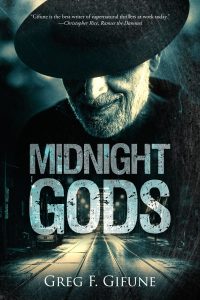
Greg F. Gifune
JournalStone Publishing (May 4, 2018)
Reviewed by Andrew Byers
Greg F. Gifune’s Midnight Gods unfolds as a chilling symphony of psychological horror, seamlessly weaving a narrative that resonates with contemporary anxieties and the timeless fears that lurk in the shadows of the human psyche. This short novel of what I might mostly describe as “quiet horror” is a masterclass in atmospheric storytelling, where Gifune’s meticulous prose and skillful plotting create an immersive experience that transcends the boundaries of conventional horror.
At its core, Midnight Gods is a tale of ordinary lives unraveling in the wake of a seemingly innocuous hit-and-run. Emily and Oliver Young, embodying the essence of suburban normalcy, find themselves ensnared in a web of paranoia and dread after a minor car accident in which Emily hits a pedestrian on the way home from a party but doesn’t bother to stop to ensure the man is unharmed. That trigger event begins a downward spiral for the couple that involves strange, unexplained behavior on Emily’s part and increasingly troubling intrusions by strangers into the Youngs’ lives. Gifune introduces readers to a nightmarish figure, a man in a fedora, whose ethereal presence casts a long shadow over the couple’s existence. The initial act, a mere accident compounded by an unethical decision made in a moment of panic, becomes a catalyst for a descent into an unsettling and otherworldly reality.
Gifune’s craftsmanship shines through in the seamless flow of his narrative. Gifune navigates the progression of paranoia within Emily and Oliver with skill and verve, allowing the reader to witness the transformation of ordinary lives into a harrowing journey through the unknown. The novella unfolds with an atmospheric finesse that captures the claustrophobia of the couple’s darkened house, where shadows and the ever-lurking man in a fedora become co-conspirators in the couple’s descent into madness. Gifune expertly balances the line between the tangible and the intangible, blurring the boundaries of reality and imagination. The result is a narrative that grips readers in a vise of psychological tension, mirroring the characters’ unraveling sanity.
The characters, particularly Emily and Oliver, serve as conduits for Gifune’s exploration of existential fear. As their personalities warp and their dreams become increasingly vivid and troubling, the reader is thrust into an immersive experience of psychological horror. Gifune delves into the nuances of their evolving relationship, creating characters whose struggles with the unknown mirror the broader fears embedded in the societal fabric.
Midnight Gods is a testament to Gifune’s ability to evoke fear without relying on gratuitous violence or explicit gore. The horror is subtle, creeping into the narrative like a shiver down the spine, leaving a lasting impression on the reader’s psyche. The mysterious man in the fedora becomes a symbolic embodiment of the fears that pervade the collective consciousness, transcending the confines of the characters’ individual experiences.
In Midnight Gods, Gifune invites readers to confront the intangible fears that lurk beneath the surface of everyday life. The novella serves as a reflection on the human condition, a metaphorical journey through the collective anxieties of contemporary society. As the characters grapple with their personal terrors, readers are compelled to confront the broader implications of fear, both manufactured and real, that permeate the world.
Midnight Gods stands as a testament to the enduring power of horror as a genre that can explore the depths of the human psyche and confront the existential uncertainties that define our existence. Greg F. Gifune’s narrative skill, combined with his ability to evoke a sense of dread, makes this novella a compelling and thought-provoking addition to the realm of psychological horror. As the story concludes with a chilling twist, readers are left with a lingering unease, a testament to the enduring impact of Gifune’s storytelling mastery.









Trackbacks/Pingbacks